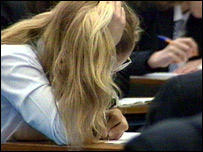|
By Penny Haslam
Reporter for Five Live Report
|


Some teachers admitted telling pupils what to write in coursework
|
Teachers are cheating to improve their pupils' exam grades, finds a BBC investigation.
Teachers blame constant testing and the importance placed on league tables for the pressure to improve results - which for some teachers has led to cheating.
One unnamed teacher from Leeds said ready-made answers were kept in a filing cabinet.
These were used by teachers to fill in missing gaps in pupils' coursework without the students' knowledge.
Another teacher told the BBC how he pointed over pupils' shoulders when they made mistakes in an exam.
'Widespread'
A survey by the Teacher Support Network, a teachers' welfare charity, found the majority of respondents thought cheating was commonplace in England.
Although a small, unscientific sample, of the 117 people who responded more than two-thirds said they personally help students "more than is appropriate" in order to improve exam results.
One respondent said: "I told a pupil what to write in coursework. I think it is cheating and this kind of thing is widespread."
Another said: "I have colleagues who actually make the design and technology practical coursework. Having complained, my head assures me that this is OK because it raises school performance figures."
Pressures
The A*-C grades, including English and maths, are used for schools' league table rankings.
A teacher from Dorset told the BBC the pressure came directly from senior teaching staff.
"I was told they had to get a C grade no matter what, which I did, which was cheating."
He said he told his pupils exactly what to write, but to change a few words to make it look like their own work.
He was so troubled by his school's attitude to deception that he resigned over it.
Cheating by teachers is so extensive that Chris Woodhead, former head of the education standards watchdog Ofsted, says the league tables used by parents to differentiate between schools have become unreliable.
"It makes a mockery of the league tables if one school is behaving professionally and another school is offering the kind of support where the teacher actually does the work for the child."
Dennis Opposs, head of monitoring at the Qualifications and Curriculum Authority, said the exam system was robust, but could be threatened by rare occurrences of cheating.
Mr Opposs told BBC Radio 4's Today programme: "We have confidence that in the great majority of cases teachers in this country running the exams follow the rules.
"We know there are some who are tempted to cheat but we insist that the rules are strict. The penalties for cheating, if you are caught, are really very severe."
He stressed rules on coursework had already been tightened, with proposals to replace it with "controlled assessment" for GCSEs.
The Schools Secretary, Ed Balls, said that cheating "will not be tolerated" but that it was "very, very rare" - and was tightly monitored by international standards.
"A panel of independent experts headed by the education director of the OECD concluded that no examination system is so tightly or carefully managed as ours. We intend to keep it that way."
'Temptation to cheat'
From 2009, coursework in subjects like English, history and business studies will be completed in the classroom, overseen by teachers.
But Mr Woodhead does not think this will address the culture of teachers cheating in schools.
"The new rules are likely to increase the temptation to cheat, because other possibilities of cheating are removed, namely parents doing work or the child downloading work from the internet."
Although at the moment the statistics and league tables can look good, the end result for pupils could well be detrimental, as one teacher pointed out.
"We're supposed to be educating human beings and teaching them how to be decent people. But we're teaching them how to cheat the system, to do whatever it takes to win."
The Five Live Report, the Teaching Taboo, is on BBC Radio Five Live on Sunday at 1100 BST and 1930 BST.


